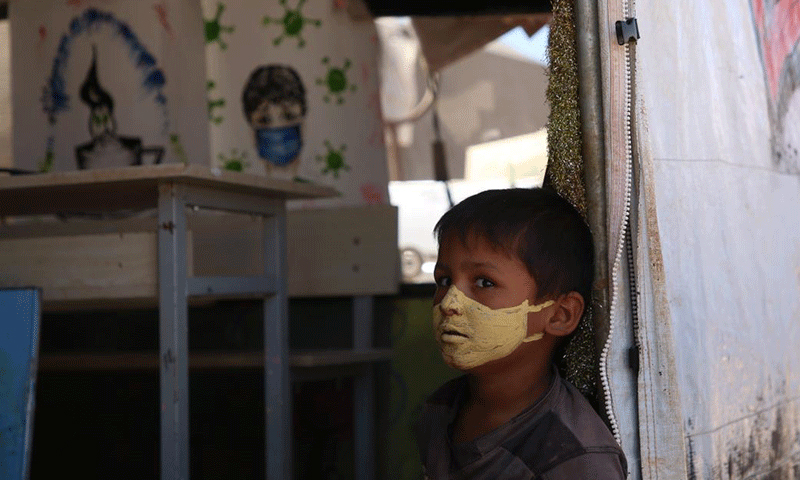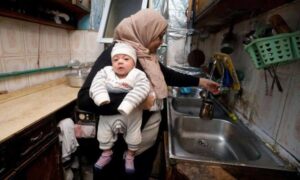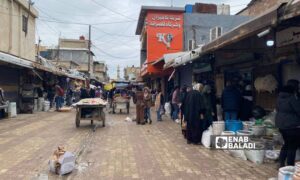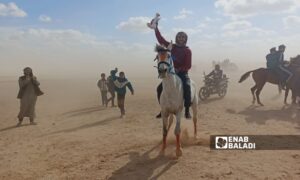
Stigma and discrimination against COVID-19 patients in Syria

Enab Baladi – Saleh Malas
“I quarantined myself at home throughout my coronavirus infection(officially known as COVID-19); However, when I actively recovered, in the first demonstration, I went out, my friends avoided contact with me; they stayed away from me. Actually, I did not get annoyed because I know how dangerous this disease is, and I do not blame them for their behavior.”
Thus, Omar al-Bam, a 22 years old photojournalist in the city of Idlib, told Enab Baladi about his experience after he got infected with the novel coronavirus (COVID-19) and his friends refused to talk to him during one of the demonstrations that took place in the city in northern Syria last October, though he recovered from the disease.
Many widespread social beliefs consider some diseases as “shameful.” Some individuals prefer not to tell people when infected by a disease. With the outbreak of the COVID-19 worldwide, some people have added it to the list of “shameful diseases.”
They unwillingly gasp whenever they hear that someone gets infected with the coronavirus, although the psychological factor plays an essential role in the treatment phase.
In some situations, war-related injuries and illnesses or other situations that confer hero status can also bring social respect and moral prestige to the disabled person. However, the vast majority of dangerous patients are simultaneously stigmatized by some people. The stigmatization and consequent discrimination of patients often restrict the possibility of their participation in everyday social life, especially if they have contagious diseases, according to an academic study published in PubMed Central (PMC), the American National Library of Medicine. Individuals who have stigmatized illnesses will be adversely affected at both psychological and social levels.
Crisis of confidence in government
The stigma associated with the coronavirus and quarantine in Syria primarily reflects social and cultural beliefs. At the same time, it demonstrates a profound crisis of confidence between society ( including government medical institutions and centers), particularly in managing the crisis of the coronavirus spread, and Syrian citizens’ s fear culture; they fear to go to public hospitals due to the deterioration of medical institutions and health care in Syria, Syrian social researcher Muhammad Salloum, said in an interview with Enab Baladi.
The link between government health care and the lack of social acceptance of the coronavirus patients, or bullying them in some cases, lies in individuals’ fear of entering the deteriorating health system.
According to what the social researcher Salloum explained, this fear translates into people’s refusal to deal with the COVID-19 patient.
Social stigma and exclusion of COVID-19 patients occur for reasons unanimously accepted by the majority. The patients are characterized by something agreed upon by society, which distinguished them negatively from the rest.
These behaviors bring back to people’s memories the “stigma” that has been associated for decades with HIV and AIDS patients.
Salloum stressed that the coronavirus disease “is not a crime nor a defect so that we are too shy to disclose it.” The real crime lies in transforming this infection into a sin that exhausts the patients both psychologically and physically,” according to researcher Salloum.
Besides, people hold COVID-19 patients responsible for their infections because they neglected following main personal protective measures against the COVID-19. This gives the impression that this person is irresponsible for his daily behavior, making him vulnerable to infection. However, this is not fully true because being infected with the coronavirus does not mean that this person has neglected to take care of his health or is not responsible in the social sense of responsibility, because every person could be infected, regardless of the individual’s social awareness, according to Salloum.
The United Nations suggested that the scale of the coronavirus outbreak in Syria “is much greater” than the confirmed cases reported.
During a virtual meeting of the UN Security Council on the humanitarian situation in Syria, on 27 October, Under-Secretary-General for Humanitarian Affairs and Emergency Relief Coordinator, Mark Lowcock, said that “The cases of COVID-19 that were confirmed in Syria were mostly the result of a community transmission,” noting that it is difficult to trace 92 percent of officially confirmed infections.
Lowcock stressed that “Healthcare facilities in some areas are reported to be unable to absorb all suspected cases. Also, as in many other countries, some health facilities are suspending surgeries or adapting wards to take in more patients.”
He was particularly concerned about the densely populated areas, such as urban centers in and around Damascus, Aleppo, and Homs, and crowded displacement camps, settlements, and collective shelters in the north-west and north-east, where the number of confirmed cases increased six-fold during last September.
Impact of social stigma on children
A member of the coronavirus advisory committee in Syria, Dr. Naboug al-Awa, denied on 25 October, that the announced numbers are identical with the infection cases among students in schools, pointing out that dealing with the virus “as a shame,” and “this ignorance would lead to an epidemic disaster.”
When people deal with a disease as a “shame” in front of children, this affects their vision of the patient himself, as explained by researcher Sallum.
Children mistreat their sick fellow because he has the coronavirus, according to their simple classification of people. This subsequently affects their relationship with their family if one of his parents, a brother, or a sister, a classmate or a teacher, for example, gets infected.
Many health awareness campaigns and psychological support initiatives were widely carried out during the coronavirus lockdown. Still, many concerned organizations did not develop awareness within the population of not stigmatizing the COVID-19 patient with negative characteristics or blaming him for others’ infection.
if you think the article contain wrong information or you have additional details Send Correction
النسخة العربية من المقال
-
Follow us :
Most viewed
- Washington clarifies to Enab Baladi Assad's claims of secret meetings with US officials
- Russian raids around al-Tanf accompanied by accusations against Americans
- Al-Assad issues decree on establishing alternative information ministry
- After controversy over his fate, Ali Mamlouk appears in Russia
- US Senate approves “Captagon II” bill, paving way for presidential signature

















 A
A
A
A
A
A








 More Society
More Society